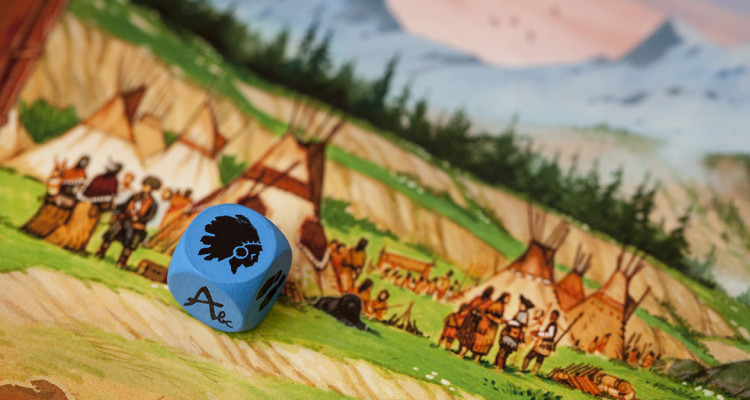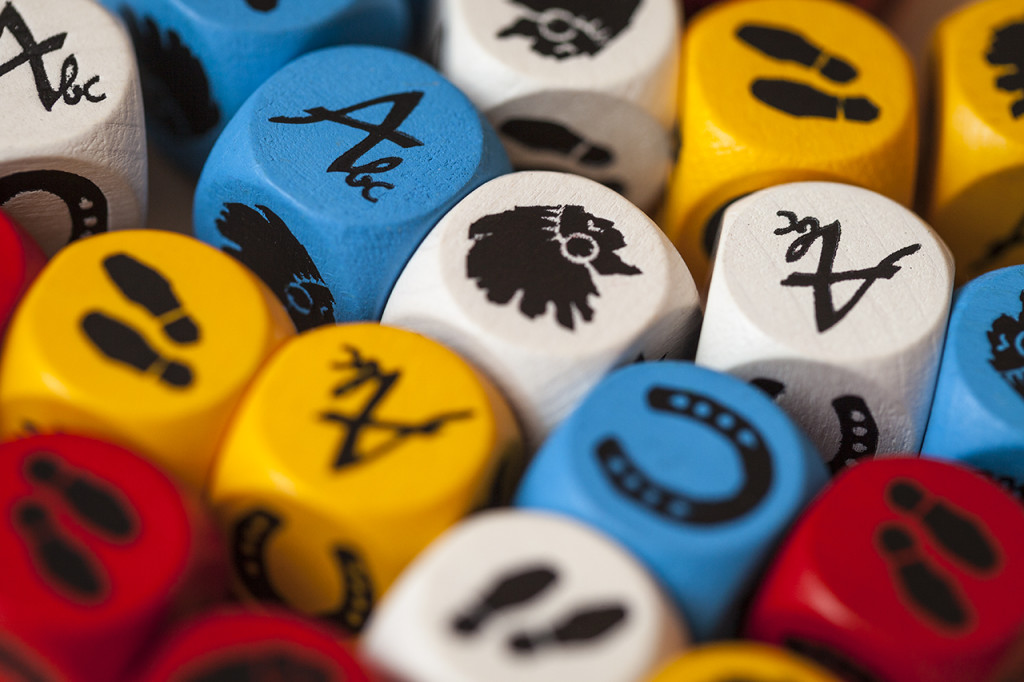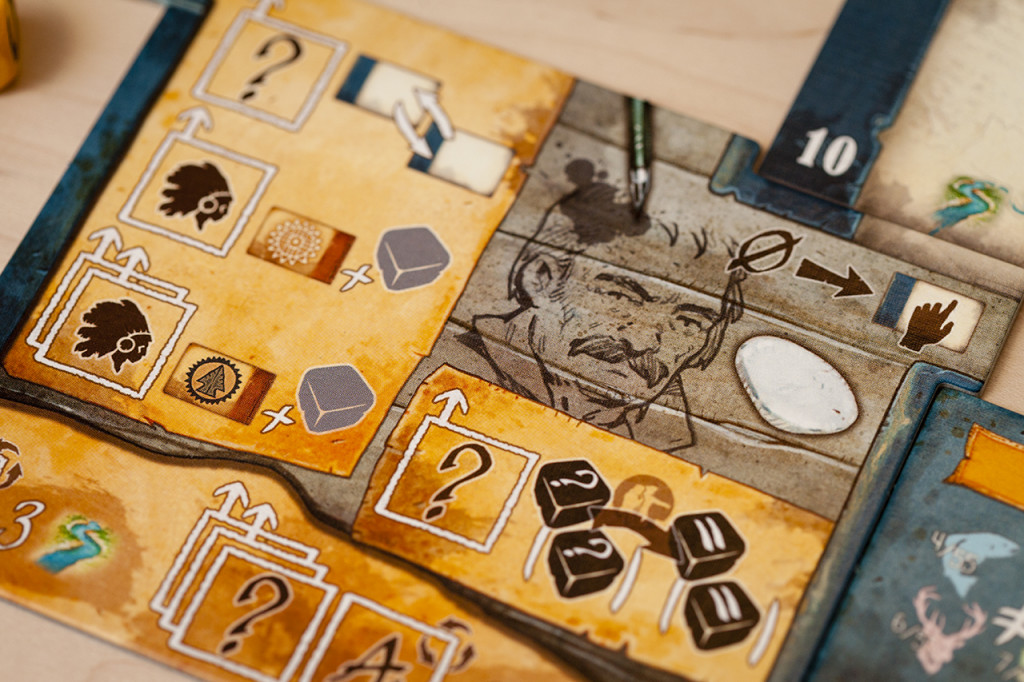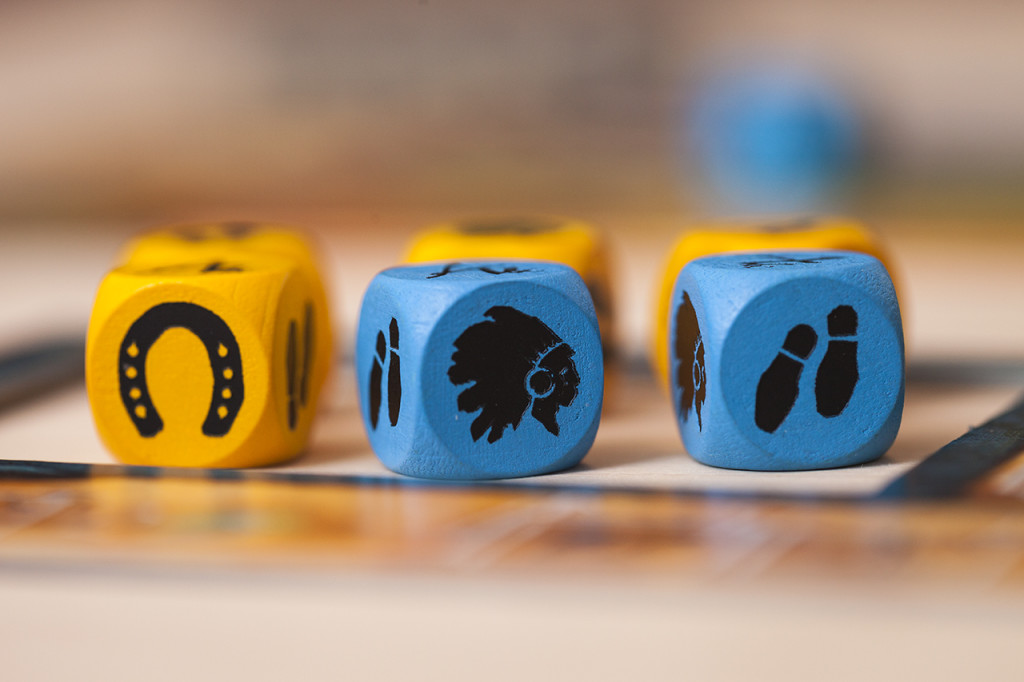D
Between 1803 and 1806, the Lewis and Clark Expedition became the first American party to travel across the North American continent from the Mississippi to the Pacific, and return. During those three years, the expedition’s leaders, Meriwether Lewis and William Clark, along with Sergeant Gass and Sergeant Ordway, wrote page after page in their journals, describing new plants and animal species which they had discovered, and drawing maps of areas previously unknown to Americans.
Discoveries: The Journals of Lewis and Clark is a dice-based worker placement game for 2-4 eager explorers from designer Cedrick Chaboussit. In the same thematic vein as the design’s spiritual predecessor, Lewis and Clark, you again take on the role of one of the Lewis and Clark Expedition leaders. This time however, you will use clever placement and manipulation of your resources in an attempt to compile knowledge of the local territories, tribes, and wildlife in your journal. The player with the most fulfilling journey at the end of the game is the winning explorer.
Before I venture into the game play itself, I need to comment on how stunning the illustrations are in this game. Vincent Dutrait has again done a superb job of immersing us in the journey undertaken by Lewis, Clark and their merry group of explorers. This, coupled with the fantastic historical facts scattered throughout the rulebook, made for a rich and flavorful experience. Discoveries is a true pleasure to look at on the table and it is also a pleasure to play.
Let’s Start Exploring!
Discoveries is a great model for minimalist design in both mechanics and components. Your turn in the game consists of two options: to use all (or some) dice of one symbol on one (or more) action spaces in your tableau, or you may choose to retrieve dice. Each die in the game has the same distribution of symbols, and you may find ‘your’ dice being used by anyone at the table in certain instances (more on that later). The “walk” and “ride” faces will be used to trigger movement during your exploration; the “negotiate” face will allow you to befriend the natives to aid in your journey; and the “journal” face records your exploration.
You will start the game with seven basic actions on your player board, while others may become available through negotiation with the native tribes. Each action space has a requirement that must be met in order to activate it. The trick is, you may only allocate dice of one chosen face on your turn (although as many of the elected face as you wish to). This means that some of the spaces can be activated in one turn, while others require more than one die facing (e.g. a walk, a ride and a journal), taking multiple turns to activate. Many of the action spaces also force you to send one or more of the dice you used off to the main board as a consequence of taking that action. These dice are unavailable to you until you take a “retrieve dice” action. Careful consideration must be given to how you manage your pool of dice to ensure that you can keep your engine churning.
So, what do we do with these actions? Enter the double-sided cards – the essence of the game. On each turn, there are three Tribe and three Discovery cards available to choose from. It is important to note that since one side features a Discovery, and the other a Tribe, the order and type of cards available will change from game to game. Additionally, depending on the player count, a number of cards will be removed from the game during setup. This increases the randomness of the card distribution, but at the same time ensures that no two games are alike.
The Discovery side of the card depicts the path or paths that are available for exploration, and additional symbols that may reward victory points, species for set collection bonuses, and/or tepees that count for a majority bonus. To complete these Discovery cards, you will use dice on appropriate action spaces to earn enough river or mountain symbols to fully traverse one of the paths shown on your chosen card [Note: river and mountain symbols must be used (fully or partially) in the order shown on the action space – they cannot be rearranged]. Extra unused symbols can be used in combination with another Discovery card on the board allowing you to complete two cards in one journal activation. This combo is quite satisfying when pulled off, and will grant you an extra turn that can prove invaluable in this quick paced game.
The Tribe side of these cards either grants you a permanent ability, or may add a generally more efficient action to those you have available, as well as tepee symbols for end-game majority scoring and a neutral gray die to add to your pool. Within the deck there are friendly tribes, which need only one negotiating die to obtain, and the wary tribes who are thematically a bit more cautious and need the use of two negotiating dice in order to acquire their services. In the spirit of the original expedition, tribes are essential to your exploration. As an example, some tribes will increase the distance by which you can travel for a reduced amount of walk and/or ride dice, while other tribes will let you treat certain die symbols as another symbol of your choosing. Gaining the aid of multiple tribes which work well together will go a long way in helping you efficiently procure the resources necessary to complete Discovery cards in quick succession.
When choosing to retrieve dice, you may pick one of three options: to collect all your colored dice, wherever they may be, or to collect ALL of the dice, regardless of color, on either the right or left side of the main board. This access to your opponent’s dice, even if only temporary, should in theory increase the interplay between players. In practice however, the threat is much more understated, as you will generally want to spend your opponent’s dice first to prevent them from being retrieved before you’ve had a chance to use them. While not a glaringly adversarial move, it must stay in the back of your mind when retrieving dice from the board or choosing which dice to use in activating actions. A well timed retrieve on your part could force your opponents into a retrieve of their own, setting them back a turn or two in the process.
Play continues until you cannot take a new Discovery card, at which point each other player gets one more turn and then you tally the final scores. Victory points are calculated by adding up the value of your Discovery cards, each full or partial set of species you’ve collected, and majority points based on the number of tepee symbols on your Tribe and Discovery cards. One more thing to note on scoring – set collection is in constant flux from game to game. Since you are removing cards at the start, the distribution of the four species that you are aiming to collect may be skewed slightly from what is shown on your player aide. While not overly burdensome, in combination with the double-sided cards, it gives set collection a press-your-luck factor with a large risk/reward payoff. The player with the most points after the tally is the winner!
Worth Discovering?
Dice games naturally elicit tactical game play. In Discoveries though, the small, yet important, binary decision points scattered throughout each turn offer a depth and strategy that keep the game interesting. Your action choices are not complex, and can sometimes seem obvious, but there is always something to do on your turn. Discoveries’ simple mechanics provide for quick turns that keep the pace flowing with little to no downtime between them.
In many euro-centric games, scarcity in actions is a central ploy that must be overcome. Discoveries is no different, as you may find that during a majority of the time the restriction of playing only one die face at a time forces you to set up and plan for a future turn. At any time your strategy could come crashing down as you see one of your opponents pip you to the Discovery/Tribe card that you were hoping to complete or acquire. You must evolve your thinking as the game state changes to best determine if pursuing your active strategy (e.g. attempting to combo two Discoveries cards) is in your best interest, or whether you should cut your losses and redirect your focus.
Scoring in the game is relatively opaque due to each player hiding their score piles. While this creates in-game tension as you second guess how well your opponents are doing, it also drives the game to be a more solitary experience. The need or want to deny your opponents a Discovery or Tribe card is not compulsory as I have found it more beneficial to focus on your own development instead of thwarting someone else’s plans. This mindset may be slightly modified in the two player game as tracking only their status becomes a more manageable task.
Discoveries is a well designed game, offering a number of interesting decisions and tensely scored games as you race across North America compiling as much knowledge as possible. In comparisons to the many dice based games to arrive in the last year or so, I have found that Discoveries has risen to the top tier. While Roll for the Galaxy still sits atop the list, I would recommend this over titles such as Asmodee’s own Nations: The Dice Game, which is a much more shallow experience in comparison. If you are a fan of dice games, Discoveries provides an elegant mixture of simple mechanics, immersive thematics and illustrations, short play time and a depth of strategy to keep your inner explorer satisfied. I highly recommend you stick it on your shelf!
[su_custom_gallery source=”media: 11273,11276″ limit=”3″ link=”lightbox” target=”blank” width=”350″ height=”350″ title=”never”]
League Ruling
Kelly
The first time I played Discoveries, I found it to be a little frustrating: having only one action per turn and having to wait for everyone else to take their turns tried my patience. I also didn’t utilize my dice in the best manner, which made completing actions sometimes take multiple turns when I could have finished something in fewer moves. That was my fault for not really paying attention to what I was doing. Playthroughs since then have been much smoother and I’ve found that my actions can, in fact, change from turn to turn depending on other players’ moves, especially with regards to completing routes or trying to recruit Native Americans for their abilities. This game is quick-paced, if you play with people who move through it quickly, and is easy to learn regardless of the speed with which you play it. I enjoyed the variety of actions you can take and that there are a few different ways that you can score points, thus not leaving you screwed if something doesn’t work out on your first try.
Matt
Objectively, I think Dan’s thoughts within the body of the review are largely accurate regarding Discoveries’ place within the hobby. It is lavishly produced – I’d even say overproduced, though the $40 price tag makes this fact a boon – and features gameplay that is a step above most of the other dice games currently on the market – particularly those that are re-implementations of “heavier” titles. Mechanically, I find little to fault with this game. The design makes sense, with enough opportunities for dice mitigation, player interaction, and decision-making to keep you interested throughout its 45-minute duration.
That being said, I still find Discoveries to be a relatively uninteresting title. Gameplay is brisk with experienced players, but still feels slow as you are limited to using one die face per turn. Given the slim player interaction, there is little your opponents can do to impact your play turn-to-turn, yet the game still forces you to move one small step at a time. Plays of Discoveries also begin to blend together, as the general gameplay remains the same. While you may toy with set collection vs. tepee majority, or grab a Native American power that you’ve never used, every game of Discoveries will still present you with basically the same combination of rivers and mountains to maneuver through.
Discoveries is definitely a game that should be on your radar, particularly if you enjoyed its predecessor, Lewis & Clark. Aside from Roll for the Galaxy, I think Discoveries is the best dice-based reimplementation on store shelves. It’s well-priced for the quality of gameplay and production value found in the box – it simply doesn’t provide enough pathways to victory or tell an interesting enough story for me to pursue it for my own collection.
Steve
I went into my first play of Discoveries knowing nothing of the game other than it was a new dice game. “Oh boy…” I thought, knowing how well me and dice games mix. After the quick rules run through and setup, we were off and… rolling. I really enjoyed my first play and was eager to play it again due to the great looking artwork and how easy it was to play. The second time around was not exactly the same. I made the mistake of being too optimistic with my choice of starting expedition and quickly fell behind. With all three of us being familiar with the game, we were nearly silent the whole time except for a quiet mumble to indicate that you were finished your turn. I ended up playing catch-up the whole game and did not do well. I do however enjoy the mechanics of the game and the dice manipulation aspects. I do find the real key is to try to optimize your strategy to get the extra turn for a double-discovery. If you can’t execute this at least once, it seems to really cause you to fall even further behind.
Ben
Discoveries has quite a few things about it that I find as positives in games. It plays fairly quickly, which I think is partly due to limited downtime (not a lot of AP in my experience). With only one option per turn, you have enough time to think while you wait for your next turn. Many decisions that you make are multi-step actions, so you tend to have several turns planned out ahead of time. With that being said, I don’t find it to be an overly exciting or engaging game with limited interaction with your opponents. I do think I preferred it with 3 players, instead of 2. It just felt as though it made the game more interesting with an added player to deal with in terms of card/dice availability. Overall, while I enjoyed it for its play length and simplicity, I do see Discoveries becoming repetitive and uninteresting in the long run.
The League of Nonsensical Gamers would like to thank Asmodee for kindly providing us with a copy of Discoveries for this review.












